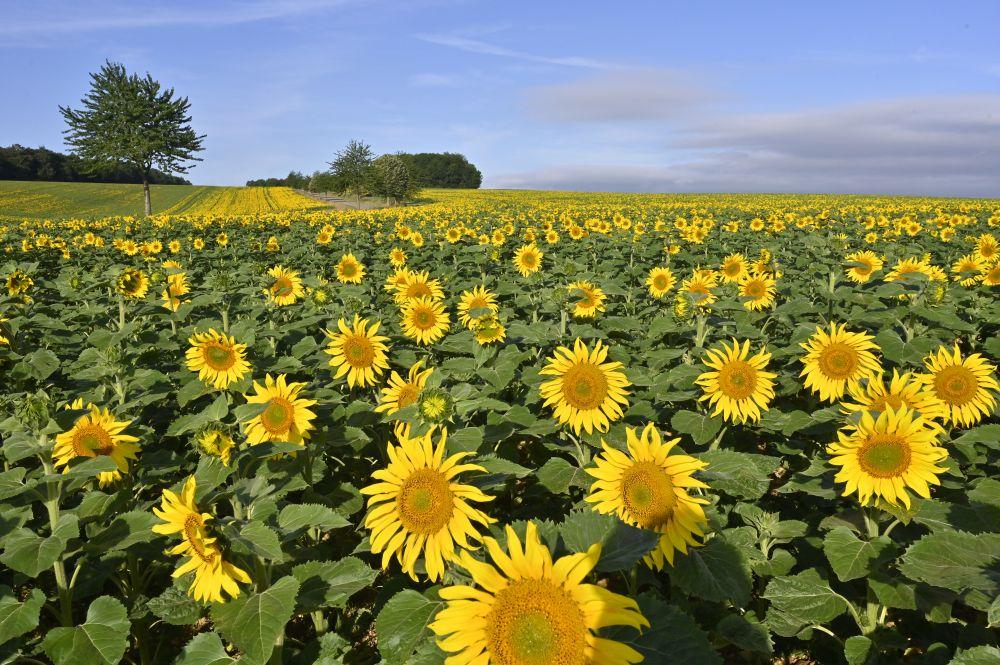Mobilization of oilseed producers helps secure sunflower supplies
Mobilization of oilseed producers helps secure sunflower supplies
Paris, November 7, 2022 - In a context marked by the impacts of the war in Ukraine, the commitment of producers to sow sunflower has enabled a good 2022 harvest despite the spring and summer drought. Terres Inovia, the technical institute of the vegetable oil and protein sector and the hemp sector, announced a harvest of 1.7 million tons (Mt) of sunflower seeds on an estimated surface of more than 840,000 hectares (ha). The average yield is estimated at 20.5 quintals (q)/ha.

A sunflower crop that will be processed mainly in France
Although the sunflower crop is down by 5% compared to 2021 (1.9 Mt in 2021), a year of exceptional yields, the 2022 crop is part of a dynamic increase in production for the third consecutive year and once again exceeds the five-year average (1.5 Mt). This production will allow industrial units to crush even more French sunflower seeds and to ensure a better coverage of the needs in oil and cake.
The mobilization of farmers has resulted in a very clear increase in the area of sunflower, 698 000 ha in 2021, an increase of at least 20%. This increase in surface area limits the effects of the drop in yield observed compared to 2021 (27.4 q/ha). According to the first analyses carried out, the oil content would be, moreover, in decline on a large part of the territory in proportions which remain to be refined.
At the regional level, the results are quite heterogeneous. In Nouvelle-Aquitaine, yields are in a range between 15 and 36 q/ha in the deepest soils or those that have benefited from irrigation. In Occitania, the average yield is low and close to 17 q/ha. The average yield is 24 q/ha in the Centre-Val de Loire region and 20 q/ha in the Grand Est, with variations between 15 and 40 q/ha in these two regions.
A campaign that once again showed the good tolerance of sunflowers to dry conditions
Sunflower has resisted well and proved, once again this year, its natural capacity to adapt during periods of intense heat and drought. Irrigation, well positioned in the crop cycle, was a differentiating factor that was fully exploited by the crop.
The heat and dry conditions limited the development of diseases. Their impact on the crop was low. In many production basins, the climatic conditions induced a slow and lesser growth of sunflowers, with impacts on flowering, which was faster than usual, and a more limited seed filling.
Overall, this year, the combination of lower yields compared to other summer crops, moderate input costs and often very attractive prices, has made sunflower profitable again, with gross margins exceeding 1,100 €/ha in the farms that make up the Terres Univia - Terres Inovia production cost observatory.
"This year, oilseed acreage is up by more than 15%, driven by rapeseed and sunflower, i.e. more than 2.2 million hectares of oilseeds. Sunflower cultivation is seeing two good harvests in succession: 2021 and its historic yields, and 2022 marked by a significant increase in acreage of more than 20%. Some regions, usually not very productive of sunflower, have strongly developed their surfaces. Producers have been there to participate in maintaining the food sovereignty of our country and to support the industry. The crushing capacity should thus increase in France," says Benjamin Lammert, President of Terres Univia.
"Sunflower has proven its ability to withstand weather conditions. Despite a drop in yields, it has withstood the year's difficult conditions better than other crops. This crop does not require a lot of water and requires irrigation that ends early in the crop cycle. In addition, the crop management support tools designed by Terres Inovia's engineers are once again proving their effectiveness. For 2023, sowing intentions would also amount to 900,000 ha, a sign of farmers' recognition of the advantages of sunflower in the face of climate change," adds Gilles Robillard, President of Terres Inovia.
For Arnaud Rousseau, President of the FOP, "While France must increase its production of plant proteins to feed its livestock and meet consumer demand for traced and sustainable oil, sunflower is asserting itself as one of the key crops to meet the national and European challenge of food sovereignty. In a context of climate change and increased tensions on the markets, I am pleased with the mobilization of producers and our oil-protein industry in favor of its development, as this crop allows us to achieve the objectives of competitiveness of farms and to provide an effective response to the challenges of the agro-ecological and climate transition."